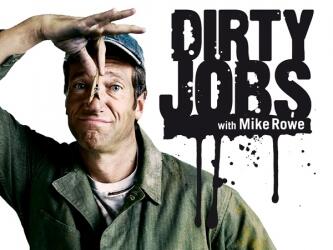
Current negotiations over the second infrastructure bill may remind a lot of people of Mike Rowe’s oddly popular series Dirty Jobs. Which makes sense. Watching a man stumble around inside a sewage tank as he gags loudly and directs us toward closeups of turds, rancid grease balls, and darkly bubbling sewage can clarify a lot about infrastructure negotiations.
That isn’t a sarcastic comparison. Rowe actually talks directly about infrastructure in Dirty Jobs, and the kinds of jobs he highlights and what he ignores can help explain recent disagreements over what qualifies as ‘real’ infrastructure. For some, infrastructure means material structures: bridges that allow traffic and goods to flow smoothly. For others, infrastructure includes workers who support society at its base, such as meatpackers who provide goods moving over those bridges, or day-care workers who help parents find time to actually have a job.
Clearly, how we define infrastructure and essential workers reflects our attitudes toward jobs that society needs in order to function but all too often considers dirty work: labor tinged with social and/moral taint. Everett Hughes’s “Good People and Dirty Work” and Eyal Press’s recent Dirty Work both discuss such morally tainted work: debt collectors, prison and concentration camp personnel, sex workers.
But when we think of infrastructure, we’re more likely to think about the kind of jobs that Ruth Simpson, Jason Hughes, and Natasha Slutskaya consider in Gender, Class, and Occupation: Working Class Men Doing Dirty Work. These jobs are physically dirty: refuse collection and street cleaning, butchery, coal mining. This sort of dirty work is the central core of Rowe’s Dirty Jobs.
Running for nearly 10 seasons, Dirty Jobs offers viewers both specific examples of dirty work and a broader understanding of infrastructure. Both the show’s content and Rowe as its narrator gained wide-spread popularity, particularly among blue-collar workers eager to see their labor displayed up close and personal.
Yet that popularity contains an inherent social paradox. While we know that dirty jobs have to be done, we usually try not to notice work that offends us, especially jobs that are morally tainted. But Dirty Jobs argues that we should see this work, especially that involving physical labor. It actually revels in displaying dirty jobs, visualizing such work fully and in detail, even as the series is properly “cleaned” to exclude morally compromised topics.
In short, Dirty Jobs features jobs high in “ick” factor but relatively low in ethical complexities. As in gory horror films, scenes are intended to shock and disturb by laying bare the permeability and deeply fluid nature of the human body and its related activities.
Equally important is Rowe’s attention to boyish, even grade-school humor material: things that are inside of or come out of bodies in various ways, some natural some decidedly not. Fecal matter — human crap, worm poop, bat guano; bodily corruption—roadkill, animal slaughter; and jobs connected to sex—artificial insemination; all loom large in early episodes of Dirty Jobs, setting its tone from the start. As Rowe himself notes, episodes are regularly “repulsive, repellant, raunchy, and rank.”
Such forms of physical dirt and bodily leakage are usually taboo, so they are either hidden or publicly visualized only in ritualized form. The standard pattern of episodes of Dirty Jobs makes it both a formalized practice and a delightful form of rule-breaking, further enhancing its boyish good humor.
To no small degree, that humor is key to defusing disgust. Rowe stands in for the audience, with his amateur performances and ongoing commentary working on many levels: pulling back the curtain, allowing both direct participation and physical distance, visually enacting horror, disgust, and enough humor to smooth the dangerous edges on all those reactions.
Read the rest of this piece at Working-Class Perspectives.
James V. Catano is producer/director of Enduring Legacy: Louisiana’s Croatian Americans and author of Ragged Dicks: Masculinity, Steel, and the Rhetoric of the Self-Made Man. He is Professor Emeritus of English and Screen Arts at Louisiana State University.












